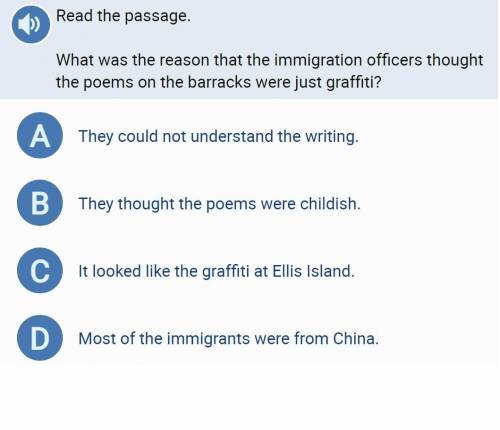
English, 02.07.2021 01:00, sgalvis455
Lol, I'll give 15 points for this.
Imagine it is 1934. Twelve-year-old Wong Kai Chong leaves China and climbs aboard an enormous ship that will be his home for nearly a month. He journeys across the Pacific Ocean with dozens and dozens of other people who dream of a new life in America. Kai's father is waiting for him in San Francisco.
2Kai's heart leaps when he finally sees the beautiful California coast. Kai knows he isn't safe yet, though. Before Kai can become an American, he must pass an interview with the immigration officers. Kai is detained, or held, at an immigration station near San Francisco called Angel Island. He waits there, like a prisoner, until the immigration officers decide whether or not to let him into America.
3During Kai's interview, the immigration officers don't seem to care that he is young, scared, and far away from his home and family for the first time. “What is the name of your village in China?” the officer barks. “How many rooms were there in your house? What did the chairs look like?” Kai knows that his answers must match what his father said before him. If they don't, he will be sent back to China.
4Kai's story is told in the book, Kai's Journey to Gold Mountain. It is the fictional account of the challenges faced by more than 175,000 Chinese immigrants who came to America between 1910 and 1940.
Coming to America
5It wasn't always so hard for Chinese people to enter the United States. The first Chinese immigrants, almost all men, arrived during the California gold rush in the mid-1800s. Gold Mountain, as they called America, was full of opportunities for Chinese immigrants. Many worked at farming, mining, and building railroads, and they were able to send money home to their families in China. Compared to the hard life that many people had in China, life on Gold Mountain was a dream.
6As more and more Chinese immigrated, however, America became less welcoming. There was a job shortage in the United States, and American laborers resented the Chinese for being willing to work for lower pay. In 1882, the U. S. government passed the Chinese Exclusion Act, making it almost impossible for Chinese workers to enter the United States. There was one group of Chinese, however, that could not be legally kept out of the country—those with a parent who was a United States citizen. Just as it is now, American law guarantees citizenship to anyone born in the United States and to anyone whose parent is a U. S. citizen, regardless of their birthplace.
7Of course, many Chinese who wanted to immigrate to the United States did not have a parent here. Their solution was to become “paper sons” and “paper daughters” by buying fake papers showing a parent residing in the United States. They could do this because Chinese who had already entered the United States would often list many people from their village or town as their sons and daughters in an effort to help others enter. This was especially easy to do after 1906, when a great earthquake in San Francisco destroyed most, if not all, of the official records.
Immigration Station
8In 1910, an immigration station opened on tiny Angel Island outside of San Francisco, off the California coast. The purpose of the Angel Island Immigration Station was to enforce the Chinese Exclusion Act. As Chinese entered San Francisco, they were inspected. Those who did not enter the country immediately were sent to Angel Island for further questioning. Angel Island was very different from the immigration station on Ellis Island—the New York entry port on the other side of the country.
9In contrast to Ellis Island, where immigrants were processed and allowed entry fairly quickly, the goal of the officials at Angel Island was to deport, or send back, as many people as possible (see table). They asked the newly arrived immigrants detailed and difficult questions about the Chinese village they had come from or their family history. They tried to trap the immigrants into giving answers different from those of their resident “parent.” Immigrants were detained on the island for weeks, months, and even years. Immigrants whose witnesses lived in the eastern United States could wait an especially long time. Detained immigrants spent most of their time crowded into military-style barracks, or bunkhouses. It was a lonely, frustrating, and often depressing experience.
Powerful Poetry
10Angel Island's doors finally closed in 1940 when China and the United States became allies during World War II (1939–1945). Then, in the 1970s, a park ranger found poetry painted, written, and engraved on the walls of the barracks. The poems describe the boredom, sadness, and even anger that many people felt during their time at Angel Island.


Answers: 1
Other questions on the subject: English


English, 21.06.2019 20:30, calmicaela12s
Use morphology and syntax to make grammatical sense of the following sentence (mark all that the ova of all mammals except the monotremes undergo holoblastic segmentation. the -s inflection indicates that monotremes is a plural noun. the suffix -ic indicates that holoblastic is an adjective. the suffix -ation in the word segmentation is a noun-forming suffix denoting a process. the -s inflection indicates that monotremes is a possessive noun.
Answers: 2

English, 21.06.2019 23:40, videogamer1192
The point of view that london uses in white fang the reader understand the perspectives
Answers: 1

English, 22.06.2019 02:30, ashleygervelus
Choose the option that includes the main claim in “the american promise”
Answers: 3
Do you know the correct answer?
Lol, I'll give 15 points for this.
Imagine it is 1934. Twelve-year-old Wong Kai Chong leaves China...
Questions in other subjects:

Mathematics, 16.11.2020 21:30


Mathematics, 16.11.2020 21:30




Geography, 16.11.2020 21:30

Mathematics, 16.11.2020 21:30







